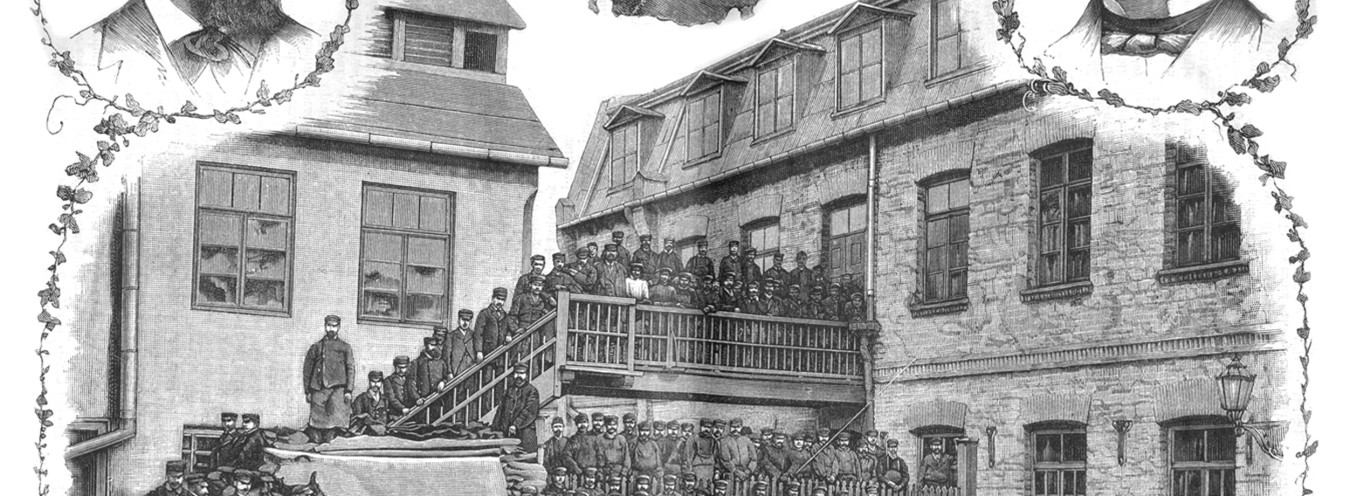
Socialism
[Figure courtesy of Warsaw Public Library – Central Library of the Masovian Province]
‘Believe me, Mr Klein, Bonapartism is still a power to be reckoned with.’ ‘There’s one that’s stronger.’ ‘What is it?’ Ignacy asked crossly. […] ‘Socialism.’ (7)
Developed in the second half of the nineteenth century, this political and social ideology adopted a variety of forms. The common point they all shared was the belief that capitalism was based on the exploitation of the working class and was characterised by considerable moral faults. Socialists, in turn, were going to create the new world order founded on solidarity, equality, and rational economic management.
In The Doll, one of Wokulski’s salesmen named Klein declares himself to be a socialist (though he refers to his creed in a whisper, concealing himself behind the porcelain). Socialism is often a matter of fierce controversy and polemics, though the author often soothes them with a dose of humour. For example, during one of the arguments between Wokulski’s salesmen Klein and Mraczewski, the latter – then hostile to socialism – states: ‘All Socialists are criminals, because they are out to divide up other people’s property – and they’re hangmen, for they have one pair of boots between two and don’t believe in using pocket-handkerchiefs.’
It may be assumed that The Doll reflects the views of many contemporary Varsovians. Between 1878 and 1880, when the action of the novel takes place, Warsaw saw an increase in propaganda for socialist ideas, and arrests were made by the Tsarist Russian occupants. Mraczewski finally converts to the new ideology. The mainstream concept of socialism can be also found in Ignacy Rzecki’s journal: admittedly, socialists claim that the earth ought to belong to those who cultivate it, that factories, coal-mines and machines ought to be the property of everyone, that there is no God or Soul which priests invented to trick people into paying tithes.
The arrests of Warsaw’s socialists in July 1879 are represented in the novel with the scene of the police detaining Klein and Baroness Krzeszowska’s student neighbours. Here is how one of them justifies his refusal to pay the rent: ‘as society didn’t kill me at birth, as it wants me to study and pass dozens of exams, it has put itself under an obligation to give me work that will ensure my survival… Yet it either refuses me work, or cheats me out of payment for it… And if society does not keep its agreement with me, why should it expect me to keep mine to it?’ This argument is a practical development of Pierre-Joseph Proudhon’s statement that any property not obtained with one’s own effort is a form of theft.
In The Doll, socialist notions are mostly embraced by people who are worse-off (salesmen, impecunious students). However, some opinions voiced by Wokulski and Julian Ochocki are also reminiscent of socialist theories. An echo of Proudhon’s slogan can be found, for example, in the following reflection of Wokulski: ‘To tell the truth […] I ought to return my exploited fortune to the community.’ The last quotation confirms both the fact that socialist ideas found their way into the minds of the intelligentsia as well as the author’s appreciation of the ideology’s potential for criticism.
Bibliografia
- J. Dziżyński, Proudhon, Warsaw 1975.
- L. Kołakowski, Główne nurty marksizmu, vol. 1-2, Warsaw 2009.


